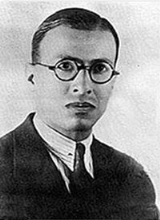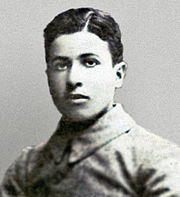
Ibrahim Touqan
Encyclopedia
Ibrahim Abd al-Fattah Touqan (, 1905–May 2, 1941) was a Palestinian nationalist
poet whose works rallied Arabs during their revolt against the British. Touqan was born in Nablus
, Palestine
during Ottoman
times. He was the brother of poetess Fadwa Touqan and he tutored and influenced her to write poetry. Ibrahim belonged to the prominent Touqan
family that governed Nablus for much of the 18th and 19th centuries.
 He attended the al-Rashadiyya al-Gharbiyya School
He attended the al-Rashadiyya al-Gharbiyya School
in western Nablus for his primary education, then St. George's School
in Jerusalem for his secondary education. He continued his studies at the American University in Beirut from 1923 to 1929. After graduating with bachelor's degree in literature, Touqan worked as a professor of Arabic literature
at an-Najah National University
in Nablus. He later worked in two jobs as a professor at the American University in Beirut and a sub-director of the Arabic Programme Section of the Jerusalem Palestine Broadcasting Station.
In 1937, he married Samia Abd al-Hadi, and they had one son, Ja'afar
, and one daughter, Urieb. Touqan had stomach problems throughout his life and in 1941 he died at the age of 36 from peptic ulcer
in the French Hospital in Jerusalem.
, as well as his mother who was fond of "heroic" Arabic literature. After encouragement from his father, Touqan took a great interest in the Qur'an
, apparently "reading it through every Ramadan
". Touqan published his first poem in 1923 while in Beirut
. There he found that the Lebanese press were very encouraging of publishing his works.
Most of his poems dealt with the Arab
struggle against the British
who had controlled Palestine since 1922 as a mandate. His poems gained fame in the Arab world
during the 1936-1939 Arab revolt in Palestine. According to author Salma Khadra Jayyusi, Touqan's poetry is marked by "sincerity and emotional veracity. His verse clear and direct, the diction simple and well-chosen, and the phrases powerful and often terse."
Here is an excerpt from one of his notable poems, Mawtini
, which he wrote during the Arab revolt:
The poem is the de facto national anthem of the Palestinian National Authority
and in 2003, Iraq
adopted the poem as its official national anthem.
Palestinian nationalism
Palestinian nationalism is the national movement of the Palestinian people. It has roots in Pan-Arabism and other movements rejecting colonialism and calling for national independence. More recently, Palestinian Nationalism is expressed through the Israeli–Palestinian conflict...
poet whose works rallied Arabs during their revolt against the British. Touqan was born in Nablus
Nablus
Nablus is a Palestinian city in the northern West Bank, approximately north of Jerusalem, with a population of 126,132. Located in a strategic position between Mount Ebal and Mount Gerizim, it is the capital of the Nablus Governorate and a Palestinian commercial and cultural center.Founded by the...
, Palestine
Palestine
Palestine is a conventional name, among others, used to describe the geographic region between the Mediterranean Sea and the Jordan River, and various adjoining lands....
during Ottoman
Ottoman Empire
The Ottoman EmpireIt was usually referred to as the "Ottoman Empire", the "Turkish Empire", the "Ottoman Caliphate" or more commonly "Turkey" by its contemporaries...
times. He was the brother of poetess Fadwa Touqan and he tutored and influenced her to write poetry. Ibrahim belonged to the prominent Touqan
Touqan
Touqan is a prominent Palestinian & Jordanian family based in Nablus and Al-Salt. During Ottoman times they were the only household that ever came close to centralizing all of the District of Nablus under their rule, and their members held the post of district chief longer than did any other local...
family that governed Nablus for much of the 18th and 19th centuries.
Biography

Rashidiya school
Rashidiya School , or Al-Rashidiya Secondary School for Boys , is a public school located in East Jerusalem next to Herod's Gate . Rashidiya served as the main learning establishment for the residents of East Jerusalem since the late Ottoman era...
in western Nablus for his primary education, then St. George's School
St. George's School, Jerusalem
St. George's School is a boys' school in East Jerusalem run by the Anglican Jerusalem diocese. It is located next to St. George's College, just outside the walls of the Old City of Jerusalem. The school was established in 1899. The author of the Thomas the Tank Engine series of books, Rev...
in Jerusalem for his secondary education. He continued his studies at the American University in Beirut from 1923 to 1929. After graduating with bachelor's degree in literature, Touqan worked as a professor of Arabic literature
Arabic literature
Arabic literature is the writing produced, both prose and poetry, by writers in the Arabic language. The Arabic word used for literature is adab which is derived from a meaning of etiquette, and implies politeness, culture and enrichment....
at an-Najah National University
An-Najah National University
An-Najah National University is a Palestinian non-governmental public university governed by a board of Trustees. It is located in Nablus, in the northern West Bank. The university has over 16,500 students and 300 professors in 19 faculties...
in Nablus. He later worked in two jobs as a professor at the American University in Beirut and a sub-director of the Arabic Programme Section of the Jerusalem Palestine Broadcasting Station.
In 1937, he married Samia Abd al-Hadi, and they had one son, Ja'afar
Ja'afar Touqan
Ja'afar Touqan is one of the pioneering Palestinian-Jordanian architects and one of the most famous as well. He designed the Municipality of Amman in Ras Il Ayn, and he belongs to several important committees including that of the National Gallery...
, and one daughter, Urieb. Touqan had stomach problems throughout his life and in 1941 he died at the age of 36 from peptic ulcer
Peptic ulcer
A peptic ulcer, also known as PUD or peptic ulcer disease, is the most common ulcer of an area of the gastrointestinal tract that is usually acidic and thus extremely painful. It is defined as mucosal erosions equal to or greater than 0.5 cm...
in the French Hospital in Jerusalem.
Poetry
Touqan's career as a poet began during his adolescence. He was greatly influenced by his grandfather who wrote zajalZajal
Zajal is a traditional form of oral strophic poetry declaimed in a colloquial dialect with ancient roots in a number of Mediterranean cultures. The form is similar to Muwashshah. The origin of zajal is Al-Andalus...
, as well as his mother who was fond of "heroic" Arabic literature. After encouragement from his father, Touqan took a great interest in the Qur'an
Qur'an
The Quran , also transliterated Qur'an, Koran, Alcoran, Qur’ān, Coran, Kuran, and al-Qur’ān, is the central religious text of Islam, which Muslims consider the verbatim word of God . It is regarded widely as the finest piece of literature in the Arabic language...
, apparently "reading it through every Ramadan
Ramadan
Ramadan is the ninth month of the Islamic calendar, which lasts 29 or 30 days. It is the Islamic month of fasting, in which participating Muslims refrain from eating, drinking, smoking and sex during daylight hours and is intended to teach Muslims about patience, spirituality, humility and...
". Touqan published his first poem in 1923 while in Beirut
Beirut
Beirut is the capital and largest city of Lebanon, with a population ranging from 1 million to more than 2 million . Located on a peninsula at the midpoint of Lebanon's Mediterranean coastline, it serves as the country's largest and main seaport, and also forms the Beirut Metropolitan...
. There he found that the Lebanese press were very encouraging of publishing his works.
Most of his poems dealt with the Arab
Arab
Arab people, also known as Arabs , are a panethnicity primarily living in the Arab world, which is located in Western Asia and North Africa. They are identified as such on one or more of genealogical, linguistic, or cultural grounds, with tribal affiliations, and intra-tribal relationships playing...
struggle against the British
United Kingdom
The United Kingdom of Great Britain and Northern IrelandIn the United Kingdom and Dependencies, other languages have been officially recognised as legitimate autochthonous languages under the European Charter for Regional or Minority Languages...
who had controlled Palestine since 1922 as a mandate. His poems gained fame in the Arab world
Arab world
The Arab world refers to Arabic-speaking states, territories and populations in North Africa, Western Asia and elsewhere.The standard definition of the Arab world comprises the 22 states and territories of the Arab League stretching from the Atlantic Ocean in the west to the Arabian Sea in the...
during the 1936-1939 Arab revolt in Palestine. According to author Salma Khadra Jayyusi, Touqan's poetry is marked by "sincerity and emotional veracity. His verse clear and direct, the diction simple and well-chosen, and the phrases powerful and often terse."
Here is an excerpt from one of his notable poems, Mawtini
Mawtini
Mawtini is a popular poem written by famous Palestinian poet Ibrahim Touqan circa 1934 in Palestine and became the de facto national anthem of Palestine and Iraq. It is also recognized in Syria and Algeria as an anthem as to show their support for the Palestinian cause. The original music was...
, which he wrote during the Arab revolt:
The poem is the de facto national anthem of the Palestinian National Authority
Palestinian National Authority
The Palestinian Authority is the administrative organization established to govern parts of the West Bank and Gaza Strip...
and in 2003, Iraq
Iraq
Iraq ; officially the Republic of Iraq is a country in Western Asia spanning most of the northwestern end of the Zagros mountain range, the eastern part of the Syrian Desert and the northern part of the Arabian Desert....
adopted the poem as its official national anthem.

